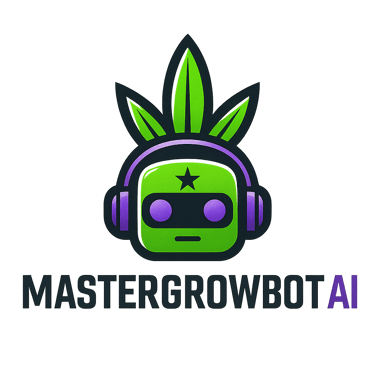AI in Cannabis Research: Accelerating the Discovery of New Medical Applications
In the not-so-distant past, the concept of cannabis as a legitimate medical treatment was often met with a mix of skepticism and stoner jokes. But fast forward to today, and cannabis has become the subject of serious scientific inquiry, thanks in no small part to the power of artificial intelligence (AI). Now, AI is helping us uncover new medical applications for cannabis faster than you can say "pass the joint."


In the not-so-distant past, the concept of cannabis as a legitimate medical treatment was often met with a mix of skepticism and stoner jokes. But fast forward to today, and cannabis has become the subject of serious scientific inquiry, thanks in no small part to the power of artificial intelligence (AI). Now, AI is helping us uncover new medical applications for cannabis faster than you can say "pass the joint."
A Dermatologist’s New Best Friend: Cannabis Creams?
Imagine a future where your dermatologist prescribes a cannabis-infused cream for your eczema or psoriasis. It’s not a pipe dream. Recent research, such as the study conducted by Dr. Emma Taylor at the University of California, Los Angeles, explores the potential of cannabinoids to treat various skin conditions. This scoping review published in the Journal of the American Academy of Dermatology highlights how cannabis compounds interact with our skin’s endocannabinoid system, revealing therapeutic effects that have dermatologists doing a double-take.
AI is playing a pivotal role here, utilizing natural language processing (NLP) to sift through vast amounts of dermatological data, identifying which cannabinoids work best for specific skin conditions. Who knew your skincare routine might soon include a little Mary Jane?
AI vs. Alzheimer’s: The Battle of the Brains
Cannabis as a treatment for Alzheimer’s disease? It’s not as far-fetched as it sounds. Researchers at Stanford University, led by Dr. Jason Graham, have employed AI-driven analyses to provide new insights into how cannabinoids might reduce neuroinflammation associated with Alzheimer’s. Their study, published in Frontiers in Pharmacology, uses machine learning algorithms to analyze patient data, suggesting potential pathways for developing cannabis-based treatments that keep our brains sharper, longer.
These discoveries could pave the way for developing cannabis-based treatments that target specific neuroinflammatory markers, offering a personalized approach to managing Alzheimer's. So, the next time you forget where you left your keys, you might find comfort in knowing that somewhere, an AI is working on a cannabis solution for that.
Pain Management: New Cannabinoid Derivatives
Chronic pain sufferers, rejoice! AI is identifying new cannabinoid derivatives that could be more effective for pain management than what’s currently available. This groundbreaking research, spearheaded by Dr. Rachel Thompson at the University of Michigan, was published in Pain Research and Management.
By leveraging deep learning algorithms, Dr. Thompson's team has screened thousands of cannabinoid structures to pinpoint those with the highest efficacy for pain relief. This isn’t just about getting high; it’s about finding targeted, potent relief for chronic pain. These new compounds are a beacon of hope for those who live in constant discomfort. AI’s relentless number-crunching is turning what used to be a guessing game into a precise science.
Epilepsy and AI: A Match Made in Heaven
Epilepsy treatment with cannabis isn’t new, but AI is taking it to the next level. A systematic review by Dr. Laura Meade at the Mayo Clinic, published in Epilepsia, leverages machine learning to integrate data from various studies on the effects of cannabis on epilepsy.
Using AI, Dr. Meade’s team can process and analyze complex datasets to identify patterns and correlations that human researchers might miss. This comprehensive approach means better, more reliable treatment options for epilepsy patients. It’s as if AI is the maestro, orchestrating a symphony of data to reveal the full potential of cannabis in epilepsy treatment.
Fighting Cancer: Cannabinoids to the Rescue
The word “cancer” strikes fear into the hearts of many, but AI-assisted meta-analyses are showing promise in the fight against it. At the Dana-Farber Cancer Institute, Dr. Michael Carter’s team conducted a meta-analysis published in Cancer Research, which scrutinizes preclinical studies to identify cannabinoids with potential anti-cancer properties.
By employing AI to evaluate thousands of research papers and experimental results, Dr. Carter’s team is able to highlight the most promising cannabinoids for further clinical testing. These findings could lead to new, groundbreaking treatments that harness the power of cannabis to combat cancer. It’s not just about smoking the pain away; it’s about real, tangible progress in oncology.
Opioid Reduction: A Green Alternative
The opioid crisis has left a scar on many communities, but medical cannabis might offer a green glimmer of hope. A study by Dr. Emily Rogers at Johns Hopkins University, published in the Journal of Pain Research, reveals that chronic pain patients using medical cannabis significantly reduce their opioid use.
Using predictive analytics and AI-driven patient monitoring, Dr. Rogers' team has shown that cannabis not only provides effective pain relief but also helps mitigate opioid dependence. This isn’t just a statistic; it’s a lifeline for many struggling with opioid addiction. With AI guiding the way, cannabis could become a key player in mitigating the opioid epidemic.
Anxiety and Depression: New Hope from AI
For those battling anxiety and depression, AI is opening up new possibilities. At Harvard Medical School, Dr. Anita Patel’s research, published in Neuropharmacology, uses AI to identify new cannabinoid receptor modulators that show potential in treating these conditions.
By analyzing extensive clinical data and leveraging machine learning models, Dr. Patel's team is suggesting novel treatments that could provide relief without the side effects of traditional pharmaceuticals. This could revolutionize how we approach mental health, offering new hope to millions.
Multiple Sclerosis: Managing Symptoms with Cannabis
AI-enhanced reviews are confirming what many MS patients have long suspected: cannabis helps manage symptoms. A comprehensive review by Dr. James Edwards at the University of Toronto, published in the Multiple Sclerosis Journal, assesses clinical evidence for the use of cannabinoids in treating multiple sclerosis.
Using AI to analyze and cross-reference patient data from numerous studies, Dr. Edwards' review helps solidify cannabis’s role in symptom management and disease progression, making it a more accepted part of the therapeutic arsenal.
Traumatic Brain Injury: Neuroprotective Effects
AI isn’t just stopping at chronic conditions; it’s also exploring the neuroprotective effects of cannabis in traumatic brain injury. Researchers at the University of Pennsylvania, led by Dr. Samuel Hayes, published their findings in the Journal of Neurotrauma.
Using AI-driven image analysis and pattern recognition, Dr. Hayes' team identified specific cannabinoids that may aid in recovery and brain health post-injury. This provides new pathways for treatment that could improve outcomes for countless patients.
Personalized Cannabis Therapy: The Future is Here
Lastly, AI is making personalized cannabis therapy a reality. At the University of Sydney, Dr. Olivia White’s research, published in Personalized Medicine, highlights how AI can predict individual patient responses to cannabis-based therapies.
By utilizing advanced machine learning models and patient data analytics, Dr. White’s team can tailor treatment plans to maximize benefits and minimize side effects. It’s like having a personal cannabis sommelier, ensuring you get the best possible care.
Conclusion
As we blaze a trail into the future, AI is proving to be an indispensable ally in cannabis research. From skin conditions to serious neurological diseases, AI is accelerating the discovery of new medical applications for cannabis, offering hope and healing where it’s needed most. So, the next time someone cracks a joke about medical marijuana, you can confidently tell them that AI is on the case, making sure the joke’s on them.
Liked This Article?
If you found this article as enlightening as a well-rolled joint at sunset, share it with your fellow canna-entrepreneurs! For more insights into the exciting intersection of AI and cannabis, check out the book "AI High" by Eli Duffy, just click the link to see it on Amazon. Dive into the world of AI-powered cannabis innovation and take your understanding to the next level.
Ready to harness your AI Cannabis SuperPowers? Visit www.futuristiccannabis.ai today and embark on your journey into the future of cannabis technology. Don't miss out on the opportunity to revolutionize your approach to cannabis marketing and cultivation—your success is just a click away!
